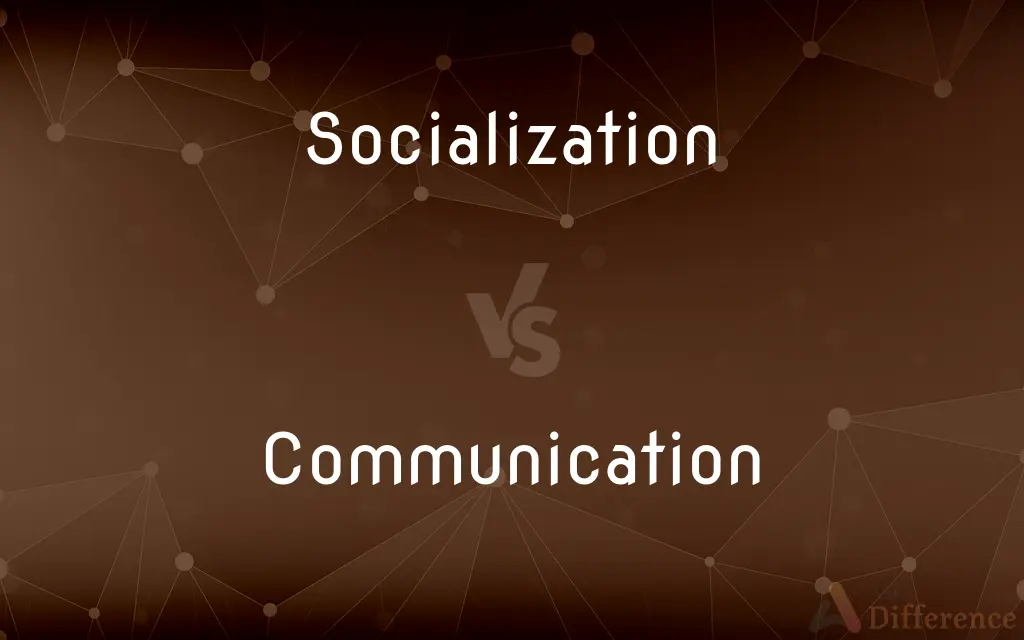Socialization vs. Communication — What's the Difference?
Edited by Tayyaba Rehman — By Fiza Rafique — Updated on April 2, 2024
Socialization is the process of learning and internalizing the norms and ideologies of society, essential for integration into social groups. Communication is the exchange of information, ideas, or feelings between individuals or groups.

Difference Between Socialization and Communication
Table of Contents
ADVERTISEMENT
Key Differences
Socialization involves the process through which individuals acquire the values, behaviors, and social norms of their culture or society to become functioning members. It is a foundational aspect of human development, enabling individuals to navigate social structures and maintain societal harmony. On the other hand, communication is the act of conveying meanings from one entity or group to another through the use of mutually understood signs, symbols, and semiotic rules. It is a fundamental human process that enables the sharing of ideas, feelings, and information, playing a crucial role in personal relationships, education, and professional settings.
While socialization is broader, encompassing the lifelong process of inheriting and disseminating norms and ideologies, communication focuses on the immediate exchange of messages. Communication serves as a vital mechanism within socialization, facilitating the transmission of cultural values, norms, and practices from one generation to the next or within peer groups.
Socialization shapes an individual's identity, beliefs, and behaviors in accordance with societal expectations, contributing to social cohesion and continuity. Communication, however, can vary in purpose, form, and content, ranging from interpersonal interactions to mass media, and does not necessarily aim to align individuals with societal norms.
The effectiveness of socialization often depends on communication, as it is through communicative acts that individuals learn about social expectations, roles, and behaviors. Conversely, effective communication requires a degree of socialization, as understanding and adhering to the norms of communication within a particular culture or context is necessary for meaningful exchanges.
Both socialization and communication are essential for the functioning of society and the development of individuals within it. Socialization ensures that individuals become part of their society, while communication enables individuals to interact, share, and connect with others, thus facilitating various forms of social organization and activity.
ADVERTISEMENT
Comparison Chart
Definition
The process of learning and internalizing societal norms and ideologies.
The exchange of information, ideas, or feelings between individuals or groups.
Purpose
To integrate individuals into society, enabling them to function within social groups.
To convey meanings, share ideas, and express feelings.
Scope
Lifelong process encompassing the acquisition of cultural values, norms, and practices.
Can be momentary or ongoing, focusing on the immediate exchange of messages.
Role in Society
Ensures societal continuity and cohesion by transmitting culture and norms.
Facilitates understanding, cooperation, and relationships among individuals.
Mechanism
Involves teaching, observation, and participation in social practices.
Involves verbal and non-verbal cues, written texts, and media.
Outcome
Individual identity formation and adherence to societal expectations.
Sharing of knowledge, resolution of conflicts, and building of connections.
Compare with Definitions
Socialization
Adapting to workplace norms for professional success.
New employees undergo socialization to adapt to company culture.
Communication
Sharing ideas during a meeting.
Effective communication in meetings enhances teamwork and productivity.
Socialization
Acquiring cultural values in school settings.
Schools play a critical role in the socialization of young individuals.
Communication
Engaging in dialogue to resolve conflicts.
Open communication is key to resolving personal and professional conflicts.
Socialization
Participating in community activities to feel a sense of belonging.
Community events serve as socialization platforms for new residents.
Communication
Expressing emotions through body language.
Non-verbal communication, like smiling, can convey happiness.
Socialization
Understanding societal roles through media consumption.
Media contributes to the socialization process by depicting societal roles.
Communication
Writing an email to provide information.
Emails are a common form of communication in professional settings.
Socialization
Learning societal norms through family interaction.
Children learn manners through socialization within their family.
Communication
Using signs and symbols for warnings.
Road signs communicate important information to drivers and pedestrians.
Socialization
In sociology, socialization is the process of internalizing the norms and ideologies of society. Socialization encompasses both learning and teaching and is thus "the means by which social and cultural continuity are attained".Socialization is strongly connected to developmental psychology.
Communication
Communication (from Latin communicare, meaning "to share"or "to be in relation with") is "an apparent answer to the painful divisions between self and other, private and public, and inner thought and outer word." As this definition indicates, communication is difficult to define in a consistent manner, because it is commonly used to refer to a wide range of different behaviors (broadly: "the transfer of information"), or to limit what can be included in the category of communication (for example, requiring a "conscious intent" to persuade). John Peters argues the difficulty of defining communication emerges from the fact that communication is both a universal phenomena (because everyone communicates), and a specific discipline of institutional academic study.One possible definition of communication is the act of developing meaning among entities or groups through the use of sufficiently mutually understood signs, symbols, and semiotic conventions.
Socialization
To place under government or group ownership or control
Socialized medical care.
Communication
The act of communicating; transmission.
Socialization
To cause to accept or behave in accordance with social norms or expectations
Techniques to socialize aggressive children.
Communication
The exchange of thoughts, messages, or information, as by speech, signals, writing, or behavior.
Socialization
To take part in social activities
Likes to socialize with people her age.
Communication
Interpersonal rapport.
Socialization
The process of learning how to live in a way acceptable to one's own society, said especially about children.
Socialization skills are important things to learn in kindergarten.
Communication
The art and technique of using words effectively to impart information or ideas.
Socialization
The act of interacting with others, of being social.
Forced socialization rarely creates strong friendships, but there are exceptions.
Communication
The field of study concerned with the transmission of information by various means, such as print or broadcasting.
Socialization
Taking under government control as implementing socialism.
Communication
Any of various professions involved with the transmission of information, such as advertising, broadcasting, or journalism.
Socialization
The action of establishing on a socialist basis;
The socialization of medical services
Communication
Something communicated; a message.
Socialization
The act of meeting for social purposes;
There was too much socialization with the enlisted men
Communication
A system, such as mail, telephone, or television, for sending and receiving messages.
Socialization
The adoption of the behavior patterns of the surrounding culture;
The socialization of children to the norms of their culture
Communication
A network of routes for sending messages and transporting troops and supplies.
Communication
Communications The technology employed in transmitting messages.
Communication
(Biology) The transfer of information from one molecule, cell, or organism to another, as by chemical or electrical signals or by behaviors.
Communication
An opening or connecting passage between two structures.
Communication
A joining or connecting of solid fibrous structures, such as tendons and nerves.
Communication
The act or fact of communicating anything; transmission.
Communication of smallpox
Communication of a secret
Communication
(uncountable) The concept or state of exchanging data or information between entities.
Some say that communication is a necessary prerequisite for sentience; others say that it is a result thereof.
The node had established communication with the network, but had as yet sent no data.
Communication
A message; the essential data transferred in an act of communication.
Surveillance was accomplished by means of intercepting the spies' communications.
Communication
The body of all data transferred to one or both parties during an act of communication.
The subpoena required that the company document their communication with the plaintiff.
Communication
An instance of information transfer; a conversation or discourse.
The professors' communications consisted of lively discussions via email.
Communication
A passageway or opening between two locations; connection.
A round archway at the far end of the hallway provided communication to the main chamber.
Communication
(anatomy) A connection between two tissues, organs, or cavities.
Communication
(obsolete) Association; company.
Communication
Participation in Holy Communion.
Communication
(rhetoric) A trope by which a speaker assumes that his hearer is a partner in his sentiments, and says "we" instead of "I" or "you".
Communication
The act or fact of communicating; as, communication of smallpox; communication of a secret.
Communication
Intercourse by words, letters, or messages; interchange of thoughts or opinions, by conference or other means; conference; correspondence.
Argument . . . and friendly communication.
Communication
Association; company.
Evil communications corrupt good manners.
Communication
Means of communicating; means of passing from place to place; a connecting passage; connection.
The Euxine Sea is conveniently situated for trade, by the communication it has both with Asia and Europe.
Communication
That which is communicated or imparted; intelligence; news; a verbal or written message.
Communication
Participation in the Lord's supper.
Communication
A trope, by which a speaker assumes that his hearer is a partner in his sentiments, and says we, instead of I or you.
Communication
The activity of communicating; the activity of conveying information;
They could not act without official communication from Moscow
Communication
Something that is communicated by or to or between people or groups
Communication
A connection allowing access between persons or places;
How many lines of communication can there be among four people?
A secret passageway provided communication between the two rooms
Common Curiosities
What forms can communication take?
Communication can be verbal, non-verbal, written, or through media, each serving different purposes in conveying messages.
Can you have socialization without communication?
Effective socialization largely depends on communication, as it is through exchanging ideas and observing behavior that social norms are learned.
How does communication play a role in socialization?
Communication is a tool through which socialization occurs, enabling the transmission of cultural norms and values.
Why is socialization important?
It is crucial for integrating individuals into society, helping them understand and fulfill their roles within various social structures.
Is socialization a one-time process?
No, socialization is a lifelong process that continues as individuals encounter new social roles and environments.
What is the main difference between socialization and communication?
Socialization is the process of learning societal norms and values, while communication is the act of exchanging information and ideas.
Can the process of socialization change over time?
Yes, as societies evolve, the norms, values, and methods of socialization may also change.
What role does social media play in socialization and communication?
Social media facilitates both by allowing for the wide dissemination of cultural norms and values and enabling instant communication across geographical distances.
How are socialization and communication taught and learned?
They are both taught through direct instruction and learned through observation and participation in social practices.
How do socialization and communication contribute to societal cohesion?
Socialization ensures the continuation of cultural norms, while communication fosters understanding and cooperation among individuals.
Can communication affect an individual’s socialization process?
Yes, the nature and content of communication can influence how an individual internalizes societal values and norms.
How do different cultures impact communication?
Cultural norms and values can significantly affect communication styles, preferences, and interpretations.
What is the impact of globalization on socialization and communication?
Globalization broadens the scope of socialization and communication, introducing individuals to a wider range of cultural norms and facilitating communication across cultural boundaries.
How do socialization and communication intersect in educational settings?
Educational settings are prime venues for socialization, where communication serves as a key mechanism for transmitting knowledge and societal values.
How does effective communication influence an individual's role in society?
It enables individuals to navigate social interactions more successfully, potentially leading to better integration and more significant contributions to society.
Share Your Discovery

Previous Comparison
Retinol vs. Aha
Next Comparison
Cannoli vs. CannoloAuthor Spotlight
Written by
Fiza RafiqueFiza Rafique is a skilled content writer at AskDifference.com, where she meticulously refines and enhances written pieces. Drawing from her vast editorial expertise, Fiza ensures clarity, accuracy, and precision in every article. Passionate about language, she continually seeks to elevate the quality of content for readers worldwide.
Edited by
Tayyaba RehmanTayyaba Rehman is a distinguished writer, currently serving as a primary contributor to askdifference.com. As a researcher in semantics and etymology, Tayyaba's passion for the complexity of languages and their distinctions has found a perfect home on the platform. Tayyaba delves into the intricacies of language, distinguishing between commonly confused words and phrases, thereby providing clarity for readers worldwide.
















































